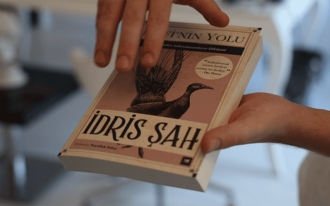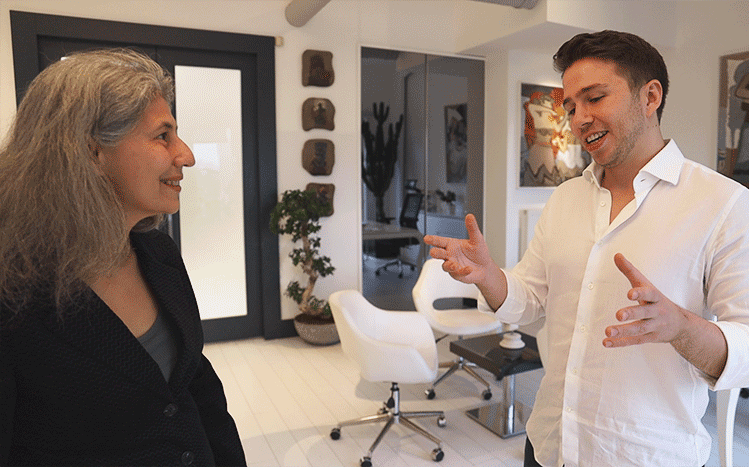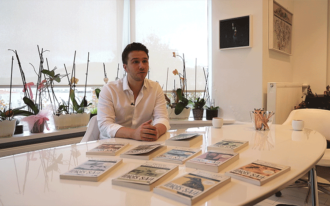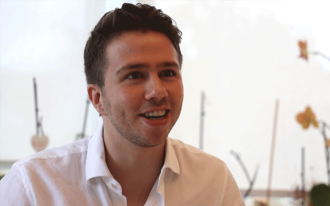Kaan Cumalıoğlu heads Destek Publishing in Istanbul. Destek is ISF’s new partner in Turkey or Türkiye. A passionate advocate of Idries Shah’s works on Sufism, Kaan believes his books can provide Turks with the answers in an increasingly complex world. Saira Shah visited Kaan in Destek’s offices in Istanbul to help launch the new Turkish editions – and he explained why he believes Idries Shah’s legacy holds such profound value for both West and East.
Saira: Why did you decide to publish Idries Shah’s books now?
Kaan: Here in Türkiye we have a big market for books on Sufi philosophy. But people are not familiar these days with Idries Shah’s writing. And I want to change that. Because what Idries Shah did was present an ideology…actually, I won’t call it an ideology, and you can’t categorise it as religion either…
My dad used to say that a lot of his work actually fits into psychology…
Exactly, Idries Shah shows us that Sufism shouldn’t be labelled as just spirituality or religion, but it’s not just a psychological system either. What it does is provide a way for people to improve themselves. I do believe that Idries Shah is a very important writer for the entire world, not just for Türkiye. But in Türkiye we need a new mindset. Because Türkiye is located between the East and the West, we’re having difficulties adapting to both worlds. We’re not very Western or very Eastern. So these books offer us a great opportunity, that we can do something about coming to terms with our identity. It’s very complicated for us. It’s like being an entropy. You know, if a molecule is in entropy, it doesn’t have direction.
How do you think Idries Shah’s books can really help with that?
 Idries Shah shows us what is valuable about our culture and can also help us better understand the West. At a deeper level if you like, Idries Shah also shows us the importance of balancing critical thinking with intuition. The Western world has a lot to offer in terms of knowledge and critical thinking. Western people, they’re very strong with their intellectual and rational skills – and we can learn from that. But in my experience, many Westerners are too rational. They’re kind of lacking something when it comes to understanding the nature of the heart and developing their intuition. It shows clearly in the way Western languages are so limited in their vocabulary when it comes to expressing emotions and feelings. European languages simply don’t compare on this level to Arabic and especially Persian. Persian poetry, for example, has an ambivalence that English can’t match. That said, in the East people need to work on their rational side. People in the East have this idea that it’s all about submission. I think what Idries Shah was saying was, ‘Look, you people in the East you need to work on your rational side, and you in the West, you should work on your intuition.’ If you can bring these two sides into balance you can solve a lot of the world’s problems. For us Turks, Idries Shah can help us better understand how to blend our intuition with our rationality, so we’re more in balance.
Idries Shah shows us what is valuable about our culture and can also help us better understand the West. At a deeper level if you like, Idries Shah also shows us the importance of balancing critical thinking with intuition. The Western world has a lot to offer in terms of knowledge and critical thinking. Western people, they’re very strong with their intellectual and rational skills – and we can learn from that. But in my experience, many Westerners are too rational. They’re kind of lacking something when it comes to understanding the nature of the heart and developing their intuition. It shows clearly in the way Western languages are so limited in their vocabulary when it comes to expressing emotions and feelings. European languages simply don’t compare on this level to Arabic and especially Persian. Persian poetry, for example, has an ambivalence that English can’t match. That said, in the East people need to work on their rational side. People in the East have this idea that it’s all about submission. I think what Idries Shah was saying was, ‘Look, you people in the East you need to work on your rational side, and you in the West, you should work on your intuition.’ If you can bring these two sides into balance you can solve a lot of the world’s problems. For us Turks, Idries Shah can help us better understand how to blend our intuition with our rationality, so we’re more in balance.

My father spent his life bringing material from the East to the West. It’s heartening to know that you think his work can now have a positive influence here today.
 Look we’re living in an age where people are really focused on differences rather than commonalities. And since I’ve experienced many cultures, I have realised people tend to look at the differences rather than how, look, we’ve got the same physique, we’ve got two arms, two legs, one head, and so on. Instead they say, okay, you’re different than me because you have a different skin colour, or you speak differently. You have an accent. It’s ridiculous. Idries Shah stands for the opposite of this. He came from the East but taught in the West. So he acted as a bridge.
Look we’re living in an age where people are really focused on differences rather than commonalities. And since I’ve experienced many cultures, I have realised people tend to look at the differences rather than how, look, we’ve got the same physique, we’ve got two arms, two legs, one head, and so on. Instead they say, okay, you’re different than me because you have a different skin colour, or you speak differently. You have an accent. It’s ridiculous. Idries Shah stands for the opposite of this. He came from the East but taught in the West. So he acted as a bridge.
I love what you say about Turkey being not very eastern and not very western. Actually that was one of the reasons why my father had a huge love for Turkey. Because you straddle different cultures, he really felt that you have a lot of the best of both of those cultures. But tell me: how are you positioning these books in Turkey? Are you putting them in self-development, wellness, psychology, spirituality, what?
 At first we were planning to publish just one of Idries Shah’s titles. But then we discovered that ISF had already translated a whole series of books into Turkish, and that the quality of the translations was exceptionally good. So it really was serendipity. When it came to where to place them we realised that they can’t be categorised as philosophy, psychology or religion. So we created our own category which we have called ‘Tasawuff’, which refers to the ideology of Sufi teaching. We are advertising them this way. You can’t put these books in one of these categories because it doesn’t fit any of them, though it fits all of them.
At first we were planning to publish just one of Idries Shah’s titles. But then we discovered that ISF had already translated a whole series of books into Turkish, and that the quality of the translations was exceptionally good. So it really was serendipity. When it came to where to place them we realised that they can’t be categorised as philosophy, psychology or religion. So we created our own category which we have called ‘Tasawuff’, which refers to the ideology of Sufi teaching. We are advertising them this way. You can’t put these books in one of these categories because it doesn’t fit any of them, though it fits all of them.
By definition, it’s almost un-categorisable. I love that because it reflects Jalaluddin Rumi’s Fihi Ma Fihi, what’s in it is in it. It is what it is. Well, I feel so lucky that we found you or you found us, or the books have found you, and I hope they are of use.
Thank you, we’re really honoured to be publishing Idries Shah. And I hope maybe we can do other projects together!